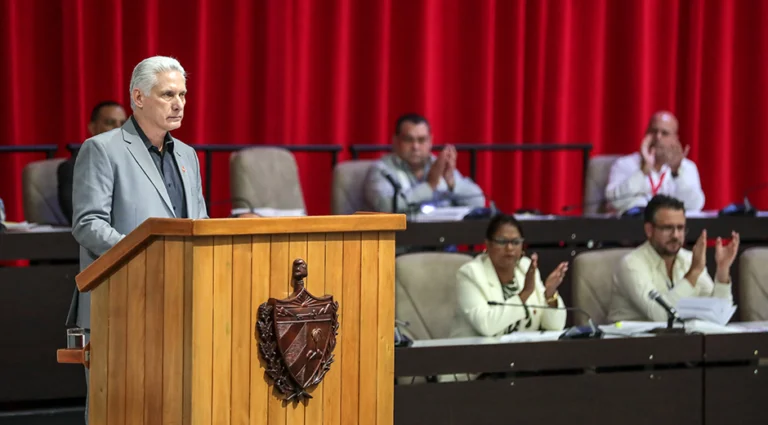Critical 2025 Address: Cuba Resilience Amid U.S. Blockade and Internal Challenges

President Díaz-Canel in 2025 parliamentary session. 20/7/2025 photo: Cubadebate
July 20, 2025 Hour: 11:53 am
Cuba resilience amid U.S. blockade and internal challenges. Díaz-Canel: “Surrender has never been an option.” Read the full analysis of Cuba’s path forward.
Geopolitical Context: Cuba Resilience Amid U.S. Blockade
Cuba resilience amid U.S. blockade was at the center of President Miguel Díaz-Canel Bermúdez’s closing speech at the National Assembly of People’s Power, held in Havana on July 21, 2025. Addressing lawmakers and citizens, Díaz-Canel reaffirmed the nation’s unyielding stance in the face of external pressures and internal economic struggles.
His speech emphasized that “surrender has never been an option”, a phrase echoing decades of Cuban resistance to U.S. economic sanctions. The president highlighted the importance of honest debate, constructive criticism, and concrete proposals to guide the country through its current challenges.
🔗 Cuban Ministry of Foreign Affairs – U.S. Blockade Reports
Honest Debates and Constructive Criticism in National Assembly
In his final address to the National Assembly, Díaz-Canel praised the open and committed discussions held during the session, calling them “sober, critical, and solution-oriented.” He stressed that despite the country’s complex economic and social landscape, the tone of the debate was never defeatist — but rather realistic and forward-looking.
“There was no pessimism, only honest assessments and proposals for change,” he said, underscoring the need for rapid reforms to modernize the economy, improve public services, and protect the rights of citizens.
The session focused on key national issues, including economic recovery, food sovereignty, sectoral reforms, and the defense of national sovereignty, all within the framework of socialist governance and self-reliance.
Cuba Resilience Amid U.S. Blockade: “Surrender Has Never Been an Option”
President Díaz-Canel delivered a powerful message of national unity and perseverance: “¡La rendición nunca ha sido alternativa!” (“Surrender has never been an option!”), a phrase that resonated across the chamber and was widely shared on social media.
This declaration reflects the long-standing Cuban narrative of resistance, shaped by decades of economic isolation, geopolitical pressure, and international sanctions. Díaz-Canel described the Cuban people as “unbreakable”, highlighting their collective spirit in the face of hardship.
He referenced historical figures like Fidel and Raúl Castro, invoking their legacy of resilience and defiance. “We are part of an unstoppable people,” he said, “and our strength lies in unity.”
Facing External Pressures: The U.S. Blockade and Global Tensions
The Cuba’s resilience amid U.S. blockade remains a defining feature of the nation’s foreign policy. The U.S. embargo, in place for over 60 years, continues to restrict Cuba’s access to international markets, essential goods, and technological development.
In recent months, the administration of former U.S. President Donald Trump has renewed economic and political pressure, including the imposition of 50% tariffs on Cuban imports, further complicating the island’s ability to engage in global trade.

“The blockade is not just an economic issue — it is a policy of strangulation,” said a Cuban diplomat in Geneva. “Yet, despite the hardships, Cuba continues to resist.”
Internal Challenges: Reform and Recovery
Beyond external pressures, Cuba is also navigating a difficult internal economic landscape, with challenges in healthcare, housing, education, and infrastructure. The National Assembly has outlined a modernization plan aimed at boosting productivity, attracting investment, and updating legal frameworks to support both public and private initiatives.
The reforms seek to accelerate economic recovery, while maintaining the socialist model that guarantees universal healthcare, education, and social protection.
“Our path forward is through reform — not retreat,” said Carmen Rojas, a delegate and economist. “We must move forward with justice and sovereignty in mind.”
National Unity and Civic Participation
Díaz-Canel called for greater civic engagement and active participation in governance, urging citizens to remain vigilant and involved in shaping the country’s future.
“Only together can we overcome these challenges and build a prosperous, just nation,” he said, echoing the principles of socialist democracy enshrined in the 2019 Cuban Constitution.
His message aligns with ongoing efforts to decentralize decision-making, encourage grassroots involvement, and reinvigorate national institutions — all while preserving the legacy of the Cuban Revolution.
Global and Regional Implications of Cuba Resistance
The Cuba resilience amid U.S. blockade is not just a national issue — it has broader implications for Latin American sovereignty and global anti-imperialist solidarity.
Cuba stance has been praised by Caribbean allies, regional governments, and international observers, who see the island as a symbol of resistance to coercive economic policies. At the same time, Western powers continue to criticize the Cuban government, framing the blockade as a tool of political pressure.
As Cuba moves forward with its reform agenda, the international community watches closely to see how the island adapts to a rapidly changing global economy — while maintaining its political independence and socialist identity.
Conclusion: A Nation of Resistance and Hope
President Miguel Díaz-Canel’s closing speech at the National Assembly was a reaffirmation of Cuba determination to resist, reform, and progress. His message — “Surrender has never been an option” — encapsulates a national ethos forged through decades of struggle, solidarity, and perseverance.
As the U.S. blockade persists, and internal reforms continue, Cuba remains committed to sovereignty, social justice, and national unity. The path ahead is challenging, but the president’s words offer a clear direction: forward, together, and without compromise.
Author: JMVR
Source: Cubadebate

